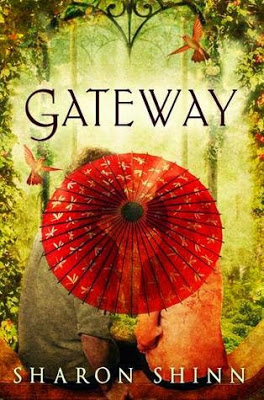 So, May is Asian Pacific Heritage Month, right? And I’m loving (unintentionally) digging out all of these books which feature Asian characters in unpredictable and non-stereotyped scenarios. Here’s another speculative fiction novel I just… happened to pick up from the library. It was published in 2009 and I don’t remember being aware of it – or, really, the author – back then. I’m reading my way through the adult Shinn novels, and just having so much fun. Until I picked it up, I hadn’t even realized this novel was for young adults! It crosses over nicely, though, for those who like a swoopy, hearts-and-violins love story.
So, May is Asian Pacific Heritage Month, right? And I’m loving (unintentionally) digging out all of these books which feature Asian characters in unpredictable and non-stereotyped scenarios. Here’s another speculative fiction novel I just… happened to pick up from the library. It was published in 2009 and I don’t remember being aware of it – or, really, the author – back then. I’m reading my way through the adult Shinn novels, and just having so much fun. Until I picked it up, I hadn’t even realized this novel was for young adults! It crosses over nicely, though, for those who like a swoopy, hearts-and-violins love story.
Summary: Daiyu loves St. Louis, loves the iconic Gateway Arch, loves the life she has there, working at her summer internship for her crazy boss, Isabel. She’s a little restless, though, a little fish-out-of-water; the adopted Chinese daughter of St. Louis natives, Daiyu is always slightly out of step, wistfully looking to the horizon for something …else. And then one day, on her lunch break “something else” finds her — first, in the form of a little old lady talking her into buying a black jade ring — because her name, daiyu, translates into “black jade” in Chinese. When Daiyu slips that ring on and walks through the Arch to go home — she finds herself somewhere utterly alien and unfamiliar. Cringing at a fireworks display, screaming at all of the Asian faces in this strange new world, Daiyu’s terror is soothed when a Caucasian boy named Kalen takes her hand. Kalen brings her to safety, and in the ensuing days becomes a friend and an anchor and a calm support in the new world in which Daiyu finds herself, and the voice of calm good sense in the adventure that lies before her. Where she is, in this new St. Louis, is just a frozen moment in her own time, but days and months in this other place. Daiyu learns that she has a job to do, and with caution and reluctance, endeavors to do it — knowing that when she does the job for which she was brought to this Asian-centric St. Louis, she will be pulled back into her own time — leaving Kalen behind forever.
Peaks: The premise of this novel is dead simple – go to this Other Place in this Other Time, do this one thing, and be allowed to go home. The choices are clear: do it, and leave the friends and loved ones she’s made in this place behind, forever, or don’t do it, and leave unfinished her life in her proper place and time. Sometimes the simplest plots have the most impact.
One of the strongest pieces of this story for me is that though she is a young adult taken in and instructed by older people, Daiyu does not accept anything on faith — not their good intentions, not their opinions on what she should be doing — no one but Kalen does she instinctively trust (and more on that later). While her job is to help topple an unfair regime in order to go home, she does not immediately leap into this action. She …thinks about it. She questions. She gets to know the opposition. She wonders over and over again if what she’s being asked to do, in return for her ticket back to her own time, is right. She shows how integrity and self-actualization is formed in an individual, while never getting preachy or weird about it.
 Valleys: This isn’t an actual “valley” per se in this novel — but it’s very definitely a romance, and in many ways, the romance supersedes other concerns. As I mentioned previously, Daiyu and Kalen’s friendship is fairly instantaneous, and her trust in him took the novel in different directions than I would have expected. Daiyu lands in this place and she just trusts this boy — because. That he is too thin and gangly but sweetly earnest helps — he’s not a hunk or anything, so it’s not a stereotyped “instalove” scenario, but his sweetness allows her to just shrug and be okay with trusting him, and thus the novel is able to downplay and reduce the jarring cultural dissociation and feelings of isolation and terror that would normally be part of being sucked into another universe. I felt that the novel was lacking sometimes in emotional resonance, making Daiyu as a character less easily empathetic.
Valleys: This isn’t an actual “valley” per se in this novel — but it’s very definitely a romance, and in many ways, the romance supersedes other concerns. As I mentioned previously, Daiyu and Kalen’s friendship is fairly instantaneous, and her trust in him took the novel in different directions than I would have expected. Daiyu lands in this place and she just trusts this boy — because. That he is too thin and gangly but sweetly earnest helps — he’s not a hunk or anything, so it’s not a stereotyped “instalove” scenario, but his sweetness allows her to just shrug and be okay with trusting him, and thus the novel is able to downplay and reduce the jarring cultural dissociation and feelings of isolation and terror that would normally be part of being sucked into another universe. I felt that the novel was lacking sometimes in emotional resonance, making Daiyu as a character less easily empathetic.
From modern St. Louis to this somewhat steampunk, somewhat backwards caste-centric and largely Asian world in which Daiyu finds herself, I would have expected the novel to explore how it might have felt to part of a transracial adoption – to be Chinese in a non-Asian family, living in a largely non-Asian community – and suddenly to find herself as Han, in the majority, instead of an ethnic minority — and also to find herself somewhat magical. Why did she trust Kalen? Because he was white? Because he reached out to her? What does she think of the people with whom he lives – a black man and a white woman? Is she more or less comfortable, being with other members of the Han caste? Yet, Daiyu is so entirely well-adjusted that she never really even refers to how she became that way, or if she has Asian friends or if she even thinks about her identity as anything other than her father’s daughter. As a matter of fact, her friends and school and usual “teen” concerns are notably absent from this book, as the plot settles on this moment in time, the adults she’s dealing with this summer, the new place she discovers, and the immediate concerns of where she is, and what she’s supposed to be doing. We’re told a little more than shown that Daiyu has a life back in St. Louis that’s deeply important that she get back to — we never see much more than a glimpse of it, and I think readers might have appreciated a bit more.
Conclusion: A little parallel universe-hopping, an improbably but engaging plot and ultimately a satisfying and surprising read for a sunny afternoon.
I received my copy of this book courtesy of the public library. You can find GATEWAY by Sharon Shinn at an online e-tailer, or at a real life, independent bookstore near you!